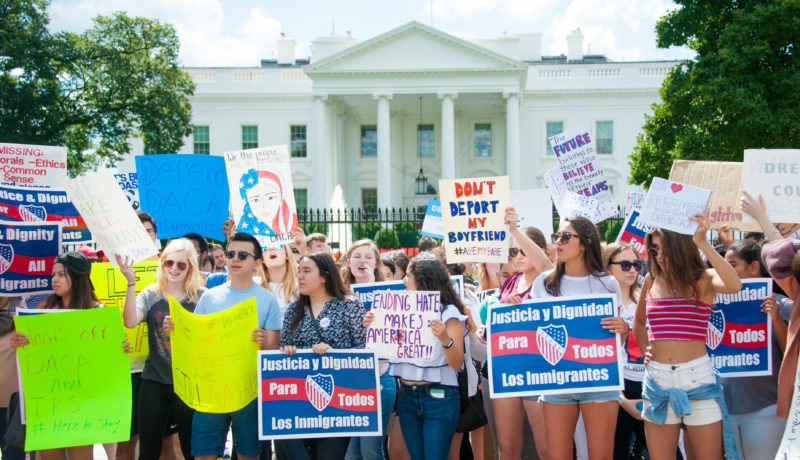I’m a DACA recipient, and the United States is my home. I was 14 years old when my family and I moved to the United States – nearly 20 years ago. I didn’t speak English, which made my high school experience especially difficult (though I bet a lot of teenagers could say that, with or without language and cultural barriers!) I went on to college, and although for many reasons that took me a lot longer than usual (10 years), I grew and found my voice. Between being undocumented and living as a young woman of color trying to navigate life, I applied for DACA in 2012. I’ve lived in uncertainty and fear most of my life, but these feelings only returned as I watched the DACA program be rescinded by the Trump administration and then sent to the Supreme Court.
 "The U.S. is home"
"The U.S. is home"
As part of United We Dream, the largest youth-led organization in the U.S. that advocates for immigrant rights, I’ve found lifelong friends in the undocumented and DACA recipient community; they are my family, and this country is my home.
When DACA was announced in 2012, I thought it was perfect timing. California had just passed the ‘CA Dream Act’ and I would finally be able to receive financial aid, allowing me the chance to finish the last two years of my undergraduate studies. With DACA, I could now apply for jobs in the professional fields I wanted.
DACA was here, and it changed my life. My dreams almost slipped away when the administration at my college, Cal State LA, refused to process financial aid for undocumented students. Yet by then I was fed up, so I joined other students in organizing to get my school to do the right thing. That’s how I found my calling. DACA allowed me to live without fear of deportation so I could focus on the community work that still needed to be done.
But I knew DACA was a temporary solution. Having to basically turn yourself in to the government, hoping that they will defer your deportation, is scary. Having to renew DACA every two years, paying close to $500 each time, being fingerprinted and photographed and catalogued is always a painful reminder that I’m not fully welcome, and that I’m always just one step away from being deported from my home.
In 2017, when Trump sent out then-Attorney General Jeff Sessions to announce the end of DACA, his smirk told us everything we already knew. They never had a “big heart” for us. They didn’t care about the impact of killing the DACA program. Thankfully, the fight wasn’t over then. I am grateful for all the institutions and organizations that took the cases all the way to the Supreme Court on our behalf.
Immigrants continue to suffer and die disproportionately. Our communities are persistently terrorized by ICE, asylum seekers at the border are left to suffer in makeshift camps in Mexico, families are separated without any records to put them back together, and detention centers have grown in numbers of detainees by the thousands, including children. The COVID19 crisis has just exacerbated these difficulties.

These are the realities we live with as we await the decision that will change the lives of hundreds of thousands of people, their families, their communities and ultimately, the country. There are close to 680,000 other DACA recipients just like me. There are also 2.5 million US citizens who live in the same household as DACA recipients. 200,000 DACA recipients are considered essential workers in the COVID-19 crisis. So, a decision from the Supreme Court wouldn’t just impact immigrant youth like me, it would impact our whole country!
The United States is our home, it’s the place where we grew up and built lives. We must continue to fight for a permanent legislative solution not only for us, but also for our families and loved ones. In June 2019, the ‘Dream and Promise Act’ (H.R.6) passed in the House of Representatives. If this bill were signed into law, it would create a pathway for citizenship for DACA recipients, TPS holders and those who qualify for DED.
Still, we know the fight is bigger than DACA and the ‘Dream and Promise Act.’ We are fighting for the right to live and thrive without fear, and although I didn’t know it when I moved here, it feels like this is what I was meant to do all along: fight for the rights and dignity of all immigrants.
Juliana Macedo do Nascimento is an immigrant born in Natal, Brazil. She moved to California at 14 years old. Juliana currently serves as the State/Local Policy Manager at United We Dream. She has a background in student and labor organizing, and holds a B.A. in Sociology from California State University, Los Angeles and a Masters in Public Policy from the Woodrow Wilson School of Public Policy at Princeton University.
